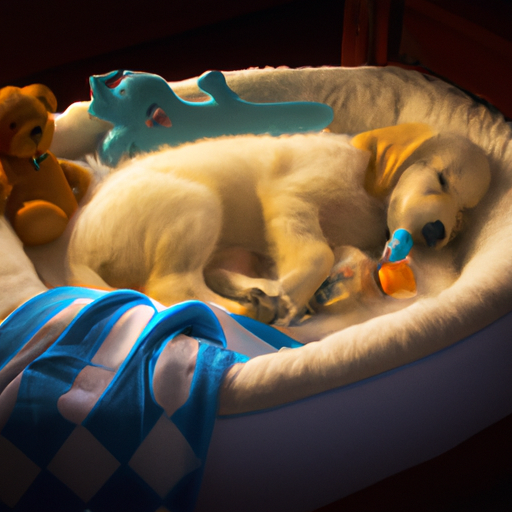1. Introduction
You’re a proud and loving caregiver to a new puppy and you’re probably wondering about their sleeping habits. Puppies are tiny bundles of energy, but they also spend a lot of time sleeping. This guide will take you through all the ins and outs of puppy sleeping and help you understand your new furry friend better.
2. Understanding Puppy Sleep Cycles
Just like human babies, puppies sleep a lot. On average, a puppy can sleep between 18 to 20 hours a day. This might seem a lot, but remember their bodies are growing and they need the rest.
Puppy sleep cycles are similar to ours. They have:
- Light sleep: Puppies are easily awakened. You’ll notice twitching ears or paws.
- Deep sleep: Puppies are relatively still and their breathing is regular.
- REM sleep: They are dreaming. You’ll notice twitching, paddling, whining or even barking.
3. Factors Affecting Puppy Sleep
Several factors impact how much and when your puppy sleeps:
- Age: Younger puppies sleep more than older ones.
- Activity: More active puppies may need more sleep.
- Health: Illness or dietary changes can affect sleep.
| Age | Average Sleep Duration |
|---|---|
| 8-12 weeks | 18-20 hours |
| 3-4 months | 15-20 hours |
| 5-12 months | 12-14 hours |
4. Tips for Healthy Puppy Sleep
Here are some tips to ensure your puppy gets the best sleep:
- Create a comfortable sleeping environment: Ensure their bed is cozy, warm, and quiet.
- Establish a routine: Puppies thrive on routine. Regular feeding, playtime, and sleep times can help them settle down easier.
- Monitor their diet: What they eat and when they eat can affect their sleep.
- Limit nap times during the day: Too many daytime naps can disrupt their nighttime sleep.
5. When to Be Concerned
While it’s normal for puppies to sleep a lot, you should watch out for warning signs. Contact your vet if your puppy:
- Is excessively sleepy or lethargic during their usual active times
- Is unable to sleep or restless at night
- Suddenly changes their sleep patterns
6. The Importance of Sleep for Puppy Growth
Sleep is crucial for your puppy’s development. During sleep, their body works hard at growing. Lack of sleep can impact their health, development, and behavior. So, make sure your little furball gets all the sleep they need.
7. Training Your Puppy to Sleep Through the Night
It’s not uncommon for puppies to have trouble sleeping through the night. Here’s a simple training routine:
- Have your puppy exercise a few hours before bedtime.
- Limit water intake before bed.
- Have a quiet time about half an hour before bed.
- Use a keyword or phrase like “bedtime” to signal it’s time to sleep.
8. Frequently Asked Questions
Q: How long do puppies sleep at night?
A: Puppies usually sleep for about 5-6 hours at night, though this can vary.
Q: Why is my puppy sleeping more than usual?
A: It could be due to growth spurts, increased activity, or illness. If you’re concerned, contact your vet.
Q: How can I help my puppy sleep through the night?
A: Establish a routine, limit naps during the day, and create a comfortable sleeping environment.
This guide should help you understand your puppy’s sleeping habits better. Always remember, every puppy is different and what works for one might not work for another. If you’re ever in doubt, don’t hesitate to contact your vet. Happy puppy parenting!



